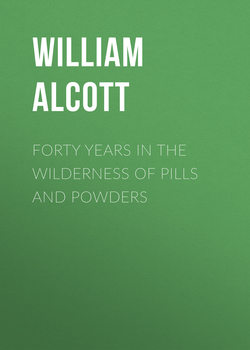Читать книгу Forty Years in the Wilderness of Pills and Powders - Alcott William Andrus - Страница 12
CHAPTER X
DR. SOLOMON AND HIS PATIENT
ОглавлениеI have said that my fellow traveller was less cautious than myself, and have intimated much more. He was in some respects cautious, and yet in others absolutely reckless. When hot and thirsty, for example, instead of just rinsing out his mouth and swallowing a very little water, he would half-fill his stomach with some of that semi-putrid stuff, ycleped water, which you often find in Virginia and the Carolinas; and when hungry, he would eat almost any thing he could lay hold of, and in almost any quantity, as well as at almost any hours, whether seasonable or unseasonable.
This course of conduct seemed to answer very well for a few months; but a day of retribution at last came. He was then in Norfolk, in Virginia. I had been absent from the place a few weeks, and on my return found him sick with a fever, and without such assistance as was absolutely and indispensably necessary. There were Yankees in the place in great numbers, and some of them were his personal acquaintances and friends; but they had hitherto refused to come near him, lest they should take the fever.
I proceeded to take care of him by night and by day. At the suggestion of an old citizen, in whom I placed great confidence, Dr. Solomon was called in as his physician. There was some bleeding and drugging, and a pretty constant attendance for many weeks; but the young man finally recovered.
If you ask what this chapter has to do with my medical confessions, I will tell you. Dr. Solomon was an old school physician, and made certain blunders, which I am about to confess for him. He prescribed – as very many of us his medical brethren formerly did, for the name of a disease rather than for the disease itself, just as it now appeared.
Thus, suppose the disease was typhus fever; in that case he seemed to give just about so many pills and powders every day, without much regard to the circumstances; believing that somehow or other, and at some time or other, good would come out of it. If his patient had sufficient force of constitution to enable him to withstand both the disease and the medicine, and ultimately to recover, Dr. S. had the credit of a cure; not, perhaps that he claimed it, – his friends awarded the honor. If the patient died, it was on account of the severity of the disease. Neither the doctor nor his medicine was supposed to be at fault. Some, indeed, regarded it as the mysterious work of Divine Providence.
Dr. S. attended my young companion in pedestrianism a long time, and sometimes brought a student into the bargain. He probably kept his patient insane with his medicine about half the time, and greatly prolonged his disease and his sufferings. But he knew no better way. He was trained to all this. The idea that half a dozen careful visits, instead of fifty formal ones, and a few shillings' worth of medicine instead of some twenty or thirty dollars' worth, would give the young man a better prospect of recovery than his own routine of fashionable book-dosing and drugging, never for once, I dare say, entered his head. And yet his head was large enough to hold such a simple idea, had it been put there very early; and the deposit would have done much to make him – what physicians will one day become – a rich blessing to the world.
Reader, are here no confessions of medical importance? If not, bear with me awhile, and you will probably find them. We have yet a long road to travel, and there are many confessions to be made in which I have a personal concern and responsibility, and, as you may perhaps conclude, no small share of downright culpability.
